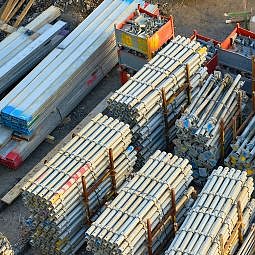
When it comes to construction, aluminum is one of the most versatile and cost-effective materials around. It's lightweight yet incredibly strong, making it ideal for structure support, insulation, cladding, and reinforcement. You can also find aluminum in construction applications, from window frames to siding to roofing materials.
Let's look at some of the different uses for aluminum in construction and how it can benefit a project.
Aluminum is incredibly useful for construction because of its many advantages over other materials. Its lightweight nature makes it easy to transport and install. Aluminum is also corrosion-resistant, so it can withstand the elements without rusting. Additionally, aluminum is non-flammable, making it an excellent choice for areas with a high fire risk.
Aluminum also provides excellent insulation; even thin sheets can block out heat and cold in the summer and winter, making it a great choice for walls and roofs. Aluminum works well when used alongside other materials like wood, steel, concrete, and brick.
Aluminum has many advantages when used in construction, but it also has some drawbacks. Aluminum is a relatively soft metal and can be prone to denting and scratching if you don't take care of it during installation. It's also not as strong as other materials, like steel, so you may have to pair it with reinforcement bars in certain applications.
The cost of aluminum can also be a concern. Although it is generally cheaper than other metals, it can quickly increase in cost when purchasing large amounts for a project. Labor costs for installing this material can also be high due to the need for specialized equipment and knowledge.
You can use aluminum in a variety of ways in buildings. It can be used in window frames, siding, roofing, and structural supports. Aluminum is also commonly used for cladding, insulation, and reinforcement bars.
Aluminum sheets are often used in exterior siding and metal roofs. These sheets come in various thicknesses and can be bent or cut to fit the desired shape. Aluminum window frames are also very popular in buildings; these are generally constructed from aluminum extrusions and come in many different styles.
Aluminum reinforcement bars, or rebars, are commonly used in concrete structures such as foundations, walls, and columns. These bars provide extra strength and stability to the structure and prevent cracking and crumbling.
Aluminum frame connectors are also sometimes used; these connectors join two pieces of aluminum to form a single piece and provide increased structural stability.
Finally, aluminum cladding is often on buildings for aesthetic purposes. This material is lightweight, easy to install, and comes in many styles, including wood grain, stone, and metallic finishes.
When selecting aluminum for your project, it's important to consider the type of application you're using it for. Different types of aluminum are better suited for certain applications. For example, thinner sheets may be better for siding, while thicker plates may be better for roofing. It's also important to know that certain grades of aluminum are better for specific applications; for example, marine-grade aluminum is better for use in areas near water or salt.
It's also important to consider the environment when choosing the right type of aluminum. If your project is in an area with high humidity, you may want to select a grade resistant to corrosion. If your project is in an area with extreme temperatures, you may want to choose a heat-resistant grade.
Finally, it's important to consider the cost of aluminum before making a purchase. Different grades and thicknesses will have different prices. Therefore, comparing prices between suppliers before settling on one is important. This comparison will help you get the best value for your money.
Aluminum can be used in various ways to create interesting and unique designs. For example, you could use aluminum sheets to construct an accent wall or ceiling in your home. Aluminum siding is also becoming increasingly popular; this material provides a modern yet classic look that will never go out of style. Additionally, aluminum extrusions can help create custom window frames for a unique look.
Aluminum cladding is also becoming increasingly popular due to its versatility and durability. You can install this material on the exterior of buildings to provide a modern aesthetic while still protecting against wind, rain, and other elements.
Finally, aluminum has many uses in furniture design. Aluminum chairs, tables, benches, and other furniture pieces can be beautiful additions to any room. Additionally, aluminum frames can be used in artwork or other decorative items.
When installing aluminum components, it's important to use the right tools and techniques. For example, you should use a drill with a speed equal to or greater than the thickness of the aluminum material. Additionally, any holes you make in the aluminum should be slightly larger than the screws so that they fit properly.
It's also important to use the right sealants and adhesives when installing aluminum components. This step will ensure the components stay in place and won't be affected by water or temperature changes.
Finally, it's important to regularly inspect your aluminum components for any signs of wear and tear. If you notice any corrosion or damage, you should act quickly to repair or replace the affected parts. This quick action will help ensure your aluminum components remain in good condition.
Aluminum is a versatile and durable material used in many different applications. Aluminum can be used to create unique and interesting designs in a variety of items, from siding and roofing to furniture and artwork. By following the tips outlined above, you can ensure you choose the right type of aluminum for your project, incorporate it into your design creatively, and maintain its condition for years to come.
A-Line Automation has extensive experience working with aluminum in a variety of applications. Contact us today to learn more about our products and services and see how we can help you with your next project.